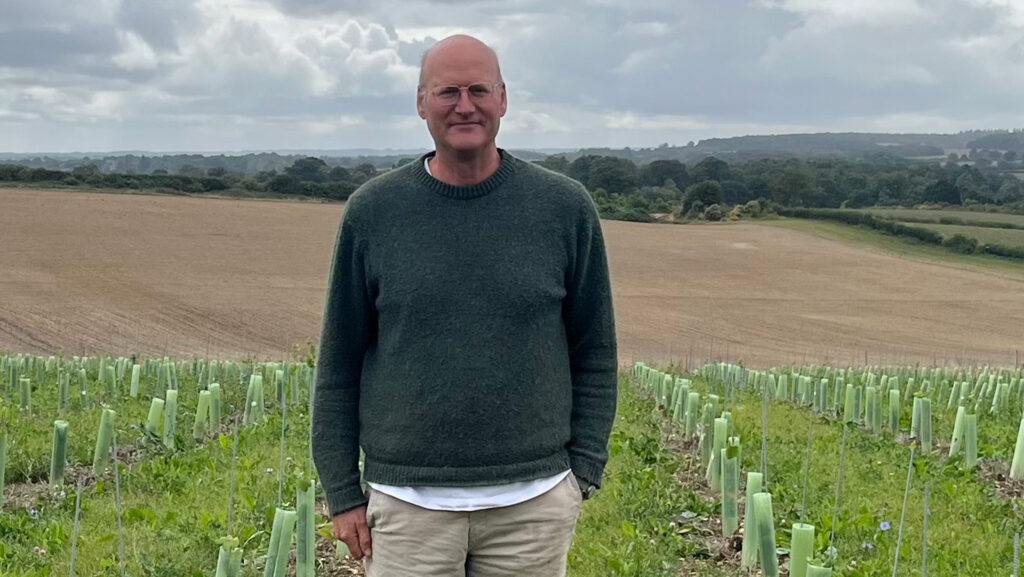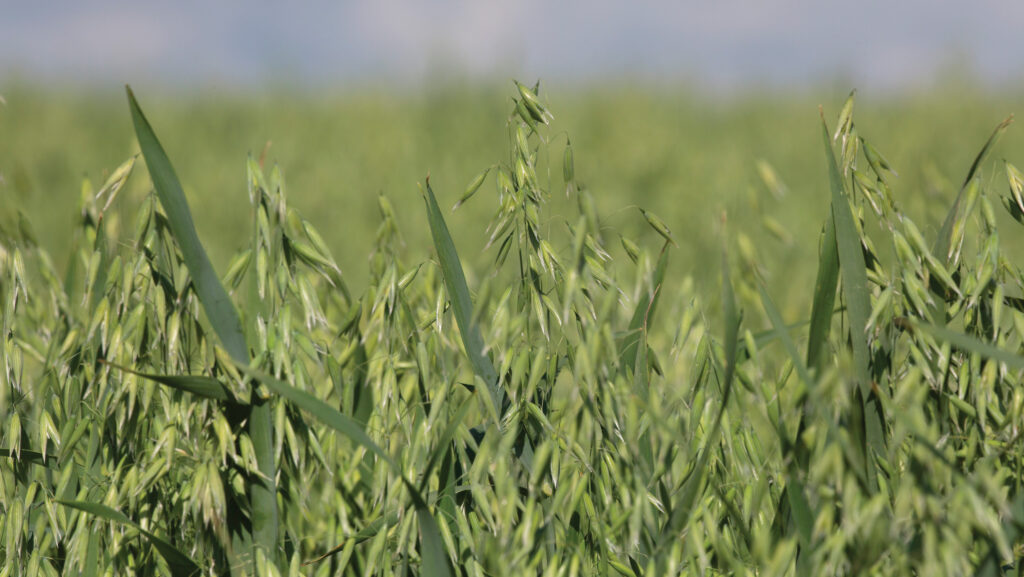Herts farmer shows how production and biodiversity combine
 Andrew Bott © Louise Impey
Andrew Bott © Louise Impey A Hertfordshire arable farmer has won the prestigious Silver Lapwing Award for his long-standing commitment to species and habitat conservation.
Andrew Bott of Finches Farm, Benington, was recognised by the judges for his willingness to go the extra mile and make a difference for biodiversity, by integrating farm-wide environmental measures with sustainable production methods.
See also: Wilts OSR grower reveals lessons from sheep grazing trials
The 377ha farm, which encompasses a short section of the River Beane, includes combinable crops, low-input hay meadows and 40ha of ancient woodland.
More recently, a vineyard, an apple orchard, cricket bat willows and a truffle plantation have been introduced, as the farm adds to its output and considers the implications of climate change.
In keeping with Andrew’s aim of providing as much connected and varied habitat as possible, there are 22 ponds on the farm, 12 of which have recently been reclaimed while three new sites have been dug.
Water
“I’m keen on water,” Andrew admits.
“Holding more water in the farmed environment is going to be important in future years, which means we will have to keep making changes to the way we farm.”
Already, all the ditches are buffered and no-till and cover crops are in place to reduce soil erosion and facilitate nutrient cycling.
Leaky dams have been used to slow the flow of water during periods of high rainfall and three 20,000-litre rainwater harvesting tanks are in place.
He has also worked closely with Affinity Water and others in the River Beane Restoration Association to improve the state of the River Beane, which is a chalk stream, so that it is no longer being pumped dry for the local town of Stevenage.
As a result, abstraction rates have fallen by 80%, with groundwater levels and river flow improving over time.
Wildlife
On the farm the combination of a diverse rotation and a low-input system involving minimal interventions has seen it deliver benefits for water and wildlife over a sustained period.
Support to achieve these ends came from farmworker Ian Deville and via the Countryside Stewardship and the Sustainable Farming Incentive
Soils have been transformed by a move away from tillage and the use of composts and biological inoculants.
Cover and companion crops have also played a role in improving soil function and structure.
As a result, the farm is alive. Some 23 species of butterfly have been recorded, barn owl numbers are thriving and spider populations have rocketed.
Most fields have flower margins either around them or through them, so beneficial insect numbers are increasing.
“We’ve been insecticide-free for the last four years,” says Andrew. “And in keeping with that, we’ve been reducing other inputs wherever possible.
“Our costs have come down and our exposure to risk is far less.”
Reduced inputs
Along with insecticides, he has stopped using seed treatments, plant growth regulators and soil-applied P and K.
Nitrogen use is falling as he continues to look for ways to reduce his reliance on artificial inputs, with tissue testing being used to fine-tune foliar applications.
The inclusion of 26ha of Wildfarmed spring wheat and 23ha of low-input spring oats in the rotation is helping to keep him on track.
“It pushes you in the right direction,” he believes. “Growing a milling wheat with no fungicides or herbicides and just 80kg of nitrogen makes you think hard about what you’re doing.”

Spring oats © Tim Scrivener
As on many farms, yields were down in 2025, he admits.
“We had very little rain from March to June but the very low spend on the Wildfarmed crop means that it produced the best gross margin on the farm.”
In the same way, he is involved in a funding initiative with Soil Association Exchange which will reward him for reducing emissions.
“In this case, I will be using 140kg/ha of nitrogen on wheat being grown after beans. It is forcing me to look at our carbon footprint.”
With government support for farms rapidly disappearing, these types of income streams will become more important, he suggests.
Soil health
Ploughing stopped at Finches Farm in 2000 and no-till has been practised since 2011.
Compost is made and applied to help build soil organic matter and a Johnson-Su bioreactor is used to make a biological inoculant which is included at drilling.
That goes down the spout with the seed and is boosted by the addition of molasses, fish hydrolysate and seaweed, to feed the soil biology and support crop and root growth.
This season, Andrew and Ian are trying out some Biocoat Gold on oilseed rape – a crop that is just coming back into the rotation after a lengthy break.
Containing humic substances and soil microbes in a powder form, it was mixed with the seed before drilling.
“In general, inoculating seed and mixing it with biologicals is as cheap as chips,” says Andrew.
“It costs us very little and we are seeing the effects on the farm – albeit at different rates on different soils.”
Energy
In addition, he has focused on conserving natural resources and improving energy efficiency on the farm.
A biomass boiler burns windfalls and coppiced hornbeam, while solar panels provide power for the farmhouse and office.
All the plastic is recycled while no wrap is required, as hay is made.
Looking ahead, Andrew has plans. He intends to keep improving soil biology and make more use of compost and brewing, as well as develop a vermicompost heap.
“We also need to find ways to increase diversity within crops. We will develop our vineyard and orchard, so that we can produce cider and wine in the future.”
Agri-environment schemes
Finches Farm is one of many arable units which will see their existing Mid Tier Countryside Stewardship agreements come to an end later this year.
The farm is concerned about what’s to follow in the absence of a replacement scheme.
Up until now, it has allowed Andrew Bott to include wild bird seed, water buffers and wildflower margins on the farm.
These are all things which have supported biodiversity and helped him move forwards with his low-input approach.
“The environment is a long-term game,” he says.
“In developing these areas, we had to forego current income for future benefit, so without that funding it’s tricky to decide what to do next.”
He suspects he will keep the existing measures in place as they now form part of his whole farm system.
“We have already taken land out of production to let for horse grazing and to make hay, so our more marginal crops are at risk. Without those, diversity decreases.”
Fortunately, two SFI 24 agreements are in place and have another two years to run, so some of his in-field practices will continue for now.
“The noises coming from government are very mixed and virtually incoherent,” he says. “My view is that current policy is not conducive to nature recovery.
“With no clear vision for farming and the forward march of climate change, the future is very uncertain.”
FWAG comment
The Farming & Wildlife Advisory Group (FWAG) is thrilled to see the trophy awarded to member Andrew Bott, says Shaun Dowman, agroecology lead adviser and FWAG East.
“Andrew’s dedication to farming and the environment is inspiring, from ancient woodlands and flower-rich grasslands to carefully restored ponds and newly created habitats, his farm is a living patchwork of biodiversity.”
He’s been insecticide-free for over four years, and his regenerative approach is a shining example of what’s possible when farming and nature work hand in hand, he adds.
